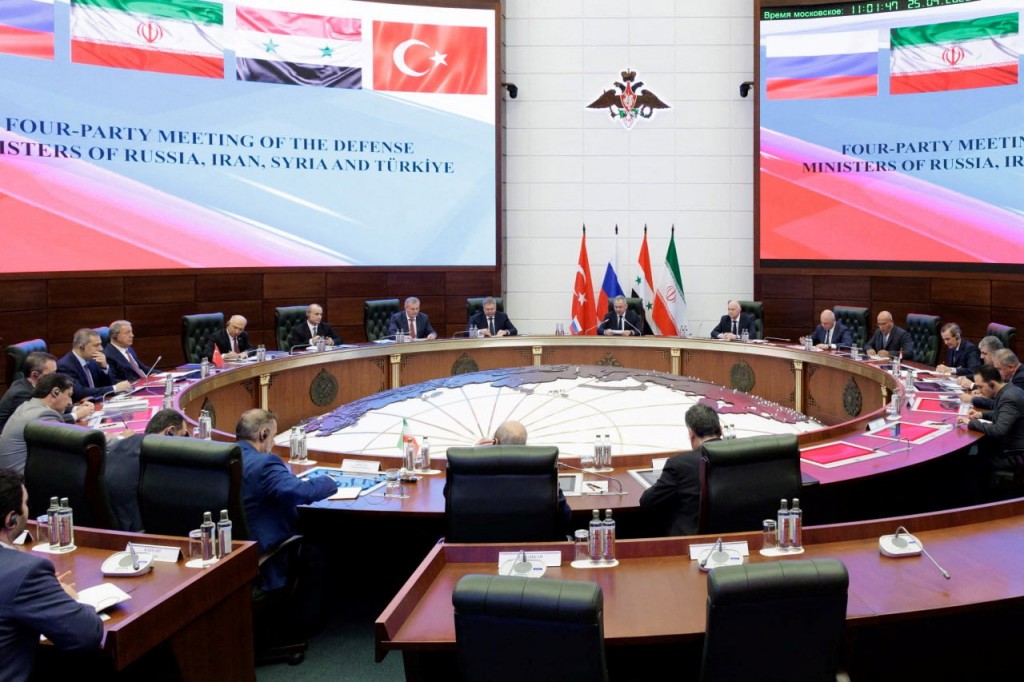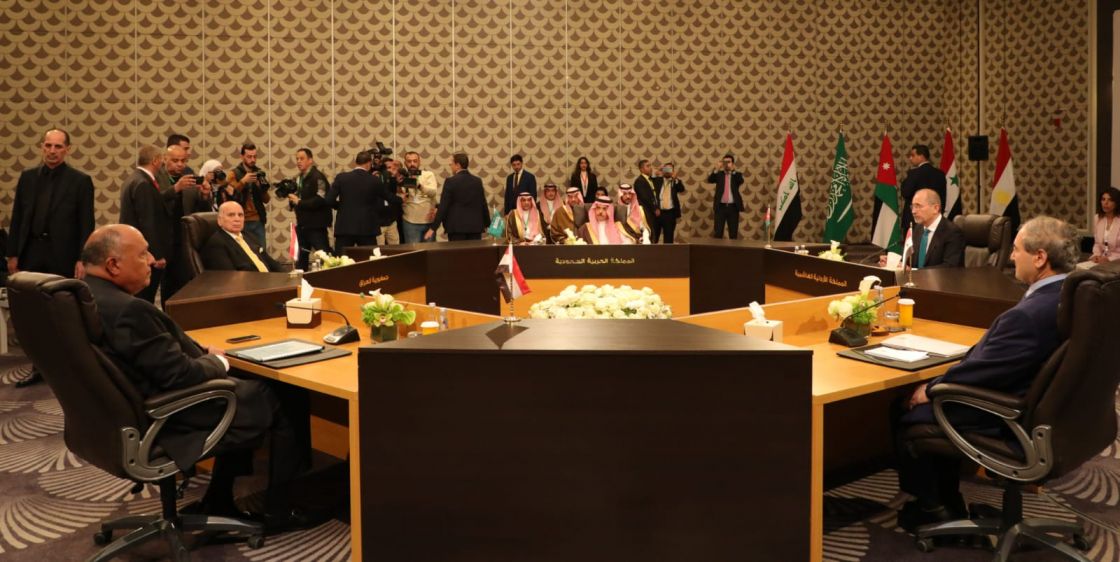- Articles
- Posted
Dreams of a Comeback of the “Small Group–Astana” Duality
Anyone following the Jordanian activity related to the Syrian crisis will notice that Jordanian officials are always keen to point out that their activity is carried out in coordination with the West, primarily with Washington and London.
Last Friday, May 5, and during an interview with American news channel, CNN, to discuss the outcomes of the ministerial meeting held in Amman on May 1, the Jordanian Foreign Minister, Ayman al-Safadi, said: “when we [Jordan] came up with our initiative, we did discuss it with the US, and they are our partners and our allies, and we work very closely together. Other Arab countries did so as well”. The same day, May 5, it was announced that there was a call between al-Safadi and Blinken, the US Secretary of State, and that the Syrian issue was discussed.
Last February 25, after Jordanian talk about a “Jordanian initiative” had started, news emerged about a call that al-Safadi had with British Foreign Secretary James Cleverly. The news said that the Minister discussed with his counterpart “the Jordanian initiative aimed at reaching a political solution to the Syrian crisis through direct Arab-Syrian engagement, according to the step-for-step approach”.
The aforementioned are two of several examples that can be compiled of Jordan’s attempts to show the new Arab activity related to Syria, as being fully coordinated with the Americans and the British. This is certainly true. Both Jordan and the UAE are coordinating with the US and Britain, and it would not be surprising if they were also coordinating with Tel Aviv in all their moves related to Syria. At the same time, however, Jordanian insinuations attempt to exaggerate the centrality of Amman’s role in the matter, and implicitly exaggerate the extent of US control over the outcome of the current Arab effort towards Syria.
Jordan, of course, is not the only one doing this, but is joined by the “media staff” or, in clearer terms, the “paid pens” of the extremists in both the regime and the opposition, whose comments and articles appear in multiple Arab and foreign newspapers.
The main arguments the extremists promote can be summarized by the following:
1- “Arabs are trying to gather their forces to form a counterbalance to the weight of Astana (Russia, Turkey, Iran) in Syria”.
2- “Arab countries are moved by the American-Israeli remote control to confront Astana in Syria, and to prevent it from monopolize the solution”.
3- “Arab countries are offering the regime an out from the ‘pressures’ imposed by the Astana tripartite, especially with regard to the Syrian-Turkish settlement”.
4- “The Syrian regime is in its most comfortable situation, because all options are open thereto, and it alone is the one to decide in which direction it wants to go, and at what price”.
If we try to broaden the viewing angle a little, without getting caught up in the details and statements, we will see that someone is trying to present the matter according to an old picture, which is the Western Small Group v. the Astana Group.
This recipe, and in particular the ability of the Americans to unite the main Arab countries on their side, has allowed prolonging and deepening the crisis for many years. Primarily, it has permitted making the decision to suspend Syria’s membership in the Arab League as an initial phase within the process of internationalizing the Syrian crisis. This same recipe actually permitted postponing the political solution and secured the margins for the extremists among Syrians, who used these margins to jump among the various sides in a way that serves preventing a political solution and the implementation of the Geneva Communique, and later UNSC Resolution 2254.
What is new is that this recipe is done once and for all, and it is no longer possible to reproduce it. Even if Jordan and with it the UAE are ready to work as part of the recipe, they are no more than mere relishes therein, and not main or effective ingredients to the extent that would require depending on them to achieve it.
The more effective ingredients, primarily Saudi Arabia and with it Egypt, are not part of something that the Americans or British are cooking for Syria, since at least two years ago. With the Saudi-Iranian settlement, and the crucial accumulation achieved in the Saudi-Chinese and Saudi-Russian relations, Saudi Arabia is not about to work within the American-“Israeli” agenda in Syria. That is because such agenda is very clear: partitioning, fragmenting, and prolonging the war under the title of “step for step”, with the aim to extend the “quagmire” situation. It is not important at all, from an American perspective, who is in power in each area of the Syrian areas. What is important, is for everyone to remain weak, and for everyone to continue fighting, and for Washington to manage the battlefield and control it. It is also important for the US that the Zionist entity is with it, indirectly or directly and blatantly in a future stage, as one of the tools to protect the entity amid the definite imminent American withdrawal, not only from Syria, but from the entire region.
Undoubtedly, each of Saudi Arabia, Egypt, and Jordan were members of the Western Small Group, the one that has practically evaporated, mainly due to the rise in the level of American-Turkish contradiction in general, and implicitly regarding Syria. There is also no doubt that any Arab meeting on Syria, especially if one measures based on what was going on two or more years ago, then one would conclude that it would have been a meeting taking place pursuant to American management and will.
Nevertheless, reality has development greatly and rapidly over the last two years, and the previous measuring methods have become old and yield the wrong results.
In reality, what happened with regard to the contradiction between the Small Group and the Astana Group can be summarized as follows:
First: 2017-present
The Astana role continues to grow and accomplish achievements on the ground. Astana’s role started with the de-escalation zones that were able to achieve a comprehensive and real ceasefire in late 2019, then the gradual transition towards playing a clear role in the political framework through the Sochi Conference in early 2018 and working on forming the Constitutional Committee. Astana’s role today includes the joint and coordinated action to achieve a Syrian-Turkish settlement that breaks Western sanctions and the Western role implicitly, and in parallel open the door to the actual implementation of a political solution, regardless of whether or not the West wants it. In parallel, the role of the Small Group was in a continuous decline, since Tillerson’s non-paper and then Pompeo’s non-paper, leading to James Jeffrey’s and Joel Rayburn’s hysteria in openly working on the “quagmire” policy.
Second: 2020-present
In parallel with Astana’s political role growing, the Western Small Group clearly started to dissolve. One expression of this was by Turkey’s absence from the group’s meeting on January 24 in Geneva, which was attended by the US, Britain, France, and Germany. Those attendees are the Western component within the group, and they seem to remain alone without Turkey, and even without the participation of the Arab countries affiliated with the Small Group.
Likewise, since Biden came to the presidency in the US, and under the cover of reacting to American arrogance in dealing with Saudi Arabia, a rapid and carefully prepared transformation was accomplished in the structure of Saudi Arabia’s international political and economic relations, and in partnership with both Russia and China. This appeared very clearly with the Saudi-Iranian settlement under Chinese-Russian auspices. However, it had also appeared prior to that on many pivotal occasions and positions, such as the positions within OPEC+, the stance from the Ukrainian crisis, as well as the implicit position regarding the “Arab NATO” and the “Abraham Accords”. Those last two are the projects for which Jordan and the UAE, respectively, took on the role of promotion agents.
This shift in the nature of the positioning of Saudi Arabia – which has the greater significance among the Arab countries – and seemingly Egypt as well, where the two countries seem to be linked by a set of understandings, exhibited at least through their public behavior, regarding several major crises and files in the region and the world. This shift adds a hint of misery to the Jordanian-American charade, which is trying to claim that the Arab activity is American-directed, or at least coordinated with the Americans, and against Astana. This, undoubtedly, falls within the framework of the aspirations of the Syrian extremists who hope to continue escaping from the patriotic decisive conjunctures for Syria, mainly a political change, and implicitly resolving issues like refugees, detainees, narcotics, and so on.
In Conclusion
The overall outcome of the new Arab movement towards Syria will be positive, precisely because the weight of the American-British-“Israeli” agents within it is the least significant. Additionally, the regional and international atmosphere makes it possible to envisage that direct cooperation between Astana and the main Arab countries in the Syrian file has become possible and necessary for all the sides that want a solution and those with an interest in it.




